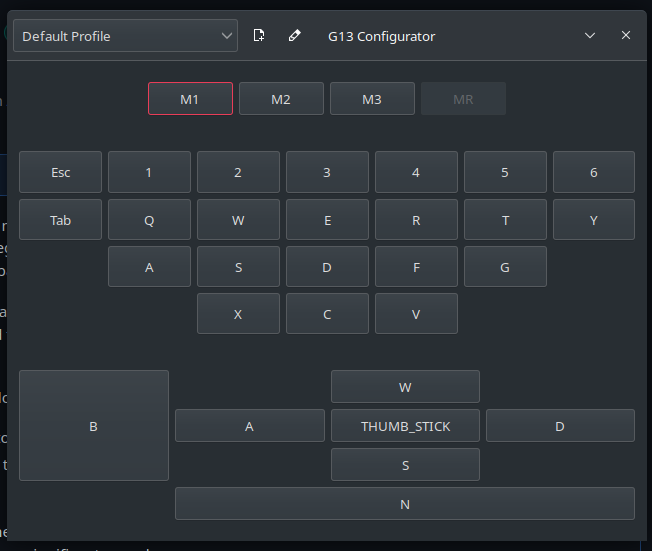This is a stand-alone companion application and user space driver for configuring a Logitech G13 game board. The original code was based upon another driver originally written by ecraven, and available at https://github.com/ecraven/g13, but this codebase was modernized, cleaned up and totally rewritten in Python.
Using this tool allows you to:
- Graphically plan out a keymapping profile
- Save multiple profiles and switch between them at will
- Use the LCD with pluggable dbus-based applets to display useful information
- Switch profiles using the LCD
All wrapped up in a glorious Gtk 3.0 + libappindicator interface.
Please note: this is an early version of the application and as such it is still in heavy development, but the author uses it almost on a daily basis already to play most of her game library.
We have a continuous build running to make packaging, and periodically those artifacts are brought over as releases on the Github site. The CI is run on June's personal infrastructure via a gitea mirror, so releases may lag behind a slight bit. June promises to redouble her efforts. :D
In general, though, g13gui is a python program, so no actual compilation takes place. All the Makefile and associated infrastructure do is assemble distro specific packages. If you want to skip the packaging (not recommended), it's entirely possible to run the program out of the source tree by doing the following:
[user@host g13gui]$ export PYTHONPATH=$PWD
[user@host g13gui]$ bin/g13gui &
[user@host g13gui]$ bin/g13-clock &
[user@host g13gui]$ bin/g13-profiles &
Note that you will have to manually install the udev rules file in etc/ to
your appropriate distro-specific location.
In the major distributions, it should just be possible to run make to build
a package for your specific distro. As of this writing, there is support to
build for Debian, Ubuntu, and an experimental package for Fedora. Patches are
welcome to help improve availability on other platforms and will be considered
on a case by case basis to protect the project's copyrights.
For the most up-to-date build instructions, have a look at the .drone.yml file, but below are more human-friendly instructions for the five supported package systems.
First, setup your system with build tooling:
lupin:~$ sudo apt-get install devscripts python3 build-essential git-buildpackage appstream dh-sequence-python3 meson
Now you can build the package:
lupin:~/src/g13gui$ make
After this completes, you'll have a shiny new deb package inside of build/ that you can
install using make install.
Arch Linux packaging is explicitly denied due to the project's lack of understanding of legal consent when it comes to copyright. See also the objection from an ex-lawyer on silent "consent" here: https://gitlab.archlinux.org/archlinux/rfcs/-/merge_requests/0040#note_222407
Fedora and its derivatives have a wild and wacky build system for making RPM packages
from .spec files. Thus, the Makefile kinda has to manage the build differently than
other builds, and modifies things outside of the source tree, sadly.
First, you need to setup your system with the build tooling:
[user@lupin g13gui]$ sudo dnf install rpmdevtools rpmlint make python meson lsb-release git
Now, here's where things get wacky. The Makefile uses rpmbuild's rpmdev-setuptree
to create the $HOME/rpmbuild directory. Unfortunately, this is entirely out of
our control, and the rpmbuild tooling insists (rather stupidly) that it work out
of this tree. So bear in mind, if you already have an rpmbuild directory tree
prepped, the Makefile will clobber it.
You can build the RPM in the usual way above, with:
[user@lupin g13gui]$ make
This will produce an RPM package you can install in the build/ subdirectory
of the source tree. Unfortunately, the rpmbuild directory will still hang
around until you issue a make clean. You can install it using make install.
If you know of a better way of building RPMs, please send a pull request. June hasn't used Fedora or RPM-based distros since she was in high school, so the tooling is entirely foreign to her.
